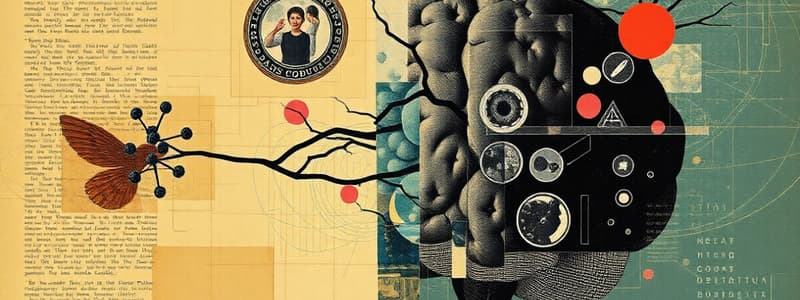Podcast
Questions and Answers
What role does oxytocin play in the birthing process?
What role does oxytocin play in the birthing process?
- It promotes bonding and engages adaptive behaviors. (correct)
- It serves solely as a pain relief hormone.
- It reduces the strength of contractions.
- It causes premature labor.
At what stage of development do teratogens cause the most damage?
At what stage of development do teratogens cause the most damage?
- After birth during the bonding phase.
- During the first year of life.
- At any stage regardless of development.
- When body parts or organs are developing. (correct)
Which statement about newborn sleep patterns is correct?
Which statement about newborn sleep patterns is correct?
- Newborn sleep duration is constant until age 4.
- Newborns sleep about as much as adults.
- Newborns spend 50% of their sleep time in REM. (correct)
- Newborns do not experience REM sleep.
What is a characteristic of crying in newborns?
What is a characteristic of crying in newborns?
What is a common misconception about the age of viability?
What is a common misconception about the age of viability?
What is synaptic pruning and when does it occur?
What is synaptic pruning and when does it occur?
Which of the following best describes fetal learning?
Which of the following best describes fetal learning?
What are teratogens?
What are teratogens?
At what stage is a fetus able to begin habituating to stimuli?
At what stage is a fetus able to begin habituating to stimuli?
What maternal factors can impact prenatal development?
What maternal factors can impact prenatal development?
How does synaptic pruning contribute to brain development?
How does synaptic pruning contribute to brain development?
Which statement about the fetus's activity is accurate?
Which statement about the fetus's activity is accurate?
What is a 'sleeper effect' in the context of teratogens?
What is a 'sleeper effect' in the context of teratogens?
Flashcards are hidden until you start studying
Study Notes
Neurotransmitters and Synaptic Pruning
- Neurotransmitters are depicted as red balls of light, facilitating impulses across neurons.
- Synaptic pruning enhances brain efficiency by removing some newly formed synapses.
- Pruning occurs throughout fetal development, infancy, childhood, and adolescence.
- The process customizes the brain according to individual experiences.
Fetal Development
- By 12 weeks of gestation, most movements observed at birth are present.
- Fetuses actively contribute to development by experiencing tactile stimuli and sensory input.
- Respond to sounds by the 6th month and can habituate to stimuli by 32 weeks, indicating learning.
Problems in Prenatal Development
- Miscarriage is a potential issue during prenatal development.
- Maternal factors affecting development include age, nutrition, disease, and stress levels.
- Teratogens are environmental agents posing risks during prenatal growth, notably during sensitive periods.
- Legal and illegal substances can act as teratogens, causing harm during critical organ development.
The Birth Experience
- Birth typically begins at around 38 weeks, although delivery can occur as early as 24 weeks (age of viability).
- Contractions and squeezing through the birth canal have adaptive value for the newborn.
- Oxytocin, released during labor, promotes bonding and is often referred to as the "love hormone."
Postpartum Issues
- Postpartum depression can occur following childbirth, impacting maternal well-being.
Sleep, Crying, and Exploration in Newborns
- Newborns sleep significantly more than adults, spending 50% of their sleep time in REM, declining to 20% by ages 3-4.
- Initial crying serves as a reflexive response to discomfort but evolves into a means of communication.
- Colic can cause severe abdominal pain in infants due to gas or intestinal obstruction.
- Newborns exhibit exploratory behaviors and can imitate others shortly after birth.
Studying That Suits You
Use AI to generate personalized quizzes and flashcards to suit your learning preferences.




